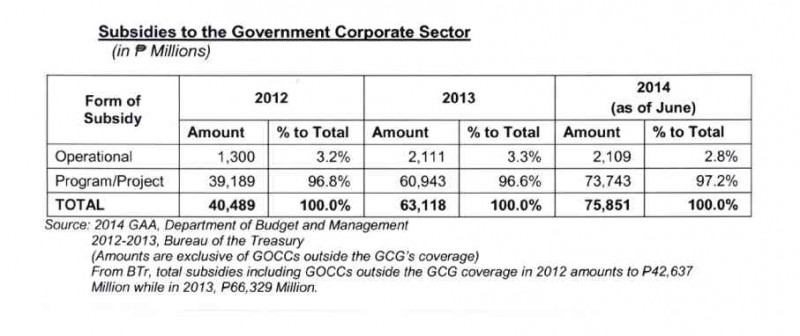This refers to Paolo G. Montecillo’s article titled “Subsidies hit P56.17B in first seven months” (Business, 9/8/14).
While we appreciate media’s vigilance on state subsidies to government-owned and -controlled corporations (GOCCs), we suggest that media distinguish between “Operational Subsidies” and “Project Subsidies” in its reporting for the benefit of the public.
Operational Subsidies are given to GOCCs that are not yet financially viable and are therefore unable to finance their operations from their own revenues for various reasons. This particular kind of subsidy requires the media’s and the public’s vigilance as the “GOCC Governance Act of 2011” (Republic Act No. 10149) itself mandates that all GOCCs should be financially viable and capable of financing their own operations. The Governance Commission has been working to reduce this kind of subsidy by either reorganizing or abolishing GOCCs, or by instituting other policy reforms.
On the other hand, Project Subsidies are granted to GOCCs that are actually financially viable and capable of funding their own operations, projects and programs. However, the number of projects and programs that can be completed within a year is necessarily limited by a GOCC’s finances.
Accordingly, Project Subsidies are granted to expedite or increase the number of projects and programs a GOCC can accomplish beyond the limitations of the GOCC’s finances. This kind of subsidy should be viewed in a positive light, since it is given to GOCCs—not as financial support but as implementing funds for priority projects and programs. As stated in the news article, the bulk of the subsidies went to GOCCs such as the National Electrification Administration, which carries out projects like the Sitio Electrification Program.
Despite the increase in total subsidies, data from 2012 up to the present show that the share of operational subsidies remains at a very low level.
As corporations, GOCCs have more operational flexibility and are often used to undertake such projects for quicker and more efficient service delivery. The Department of Budget and Management and the Governance Commission also ensure that GOCCs are held accountable for the efficient implementation of these projects through their respective GOCC Performance Scorecards.
Details on GOCCs’ Performance Scorecards, as well as the Governance Commission’s Annual Report, may be accessed on our website, www.gcg.gov.ph.
—PAOLO E. SALVOSA,
spokesperson,
Governance Commission
for Government Owned or Controlled Corporations
